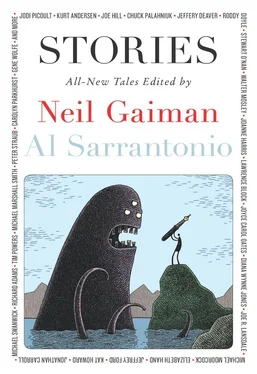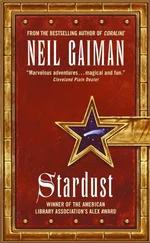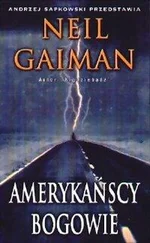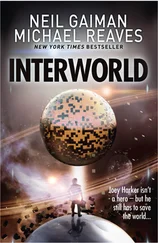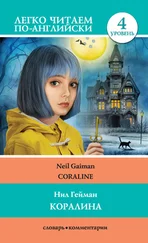Neil Gaiman - Stories - All-New Tales
Здесь есть возможность читать онлайн «Neil Gaiman - Stories - All-New Tales» весь текст электронной книги совершенно бесплатно (целиком полную версию без сокращений). В некоторых случаях можно слушать аудио, скачать через торрент в формате fb2 и присутствует краткое содержание. Жанр: Фантастика и фэнтези, на английском языке. Описание произведения, (предисловие) а так же отзывы посетителей доступны на портале библиотеки ЛибКат.
- Название:Stories: All-New Tales
- Автор:
- Жанр:
- Год:неизвестен
- ISBN:нет данных
- Рейтинг книги:3 / 5. Голосов: 1
-
Избранное:Добавить в избранное
- Отзывы:
-
Ваша оценка:
- 60
- 1
- 2
- 3
- 4
- 5
Stories: All-New Tales: краткое содержание, описание и аннотация
Предлагаем к чтению аннотацию, описание, краткое содержание или предисловие (зависит от того, что написал сам автор книги «Stories: All-New Tales»). Если вы не нашли необходимую информацию о книге — напишите в комментариях, мы постараемся отыскать её.
Stories: All-New Tales — читать онлайн бесплатно полную книгу (весь текст) целиком
Ниже представлен текст книги, разбитый по страницам. Система сохранения места последней прочитанной страницы, позволяет с удобством читать онлайн бесплатно книгу «Stories: All-New Tales», без необходимости каждый раз заново искать на чём Вы остановились. Поставьте закладку, и сможете в любой момент перейти на страницу, на которой закончили чтение.
Интервал:
Закладка:
Neil Gaiman, Al Sarrantonio
Stories: All-New Tales
(Neil Gaiman Short Stories — 1)
INTRODUCTION
AL SARRANTONIO AND I WERE DISCUSSING anthologies of short stories. He had edited a huge anthology of cutting-edge horror, and another of cutting-edge fantasy, each book, in its way, definitive. And in talking, we realised that we had something in common: that all we cared about, really, were the stories. What we missed, what we wanted to read, were stories that made us care, stories that forced us to turn the page. And yes, we wanted good writing (why be satisfied with less?). But we wanted more than that. We wanted to read stories that used a lightning flash of magic as a way of showing us something we have already seen a thousand times as if we have never seen it before. Truly, we wanted it all.
And slowly, the wish becomes the deed…
When I was a child, I pestered my elders for stories. My family would improvise, or read me stories from books. As soon as I was old enough to read, I was one of those children who needed to have a book within reach. I would read a book a day, or more. I wanted stories, and I wanted them always, and I wanted the experience that only fiction could give me: I wanted to be inside them.
Television and cinema were all very well, but these stories happened to other people. The stories I found in books happened inside my head. I was, in some way, there.
It’s the magic of fiction: you take the words and you build them into worlds.
As time passed, I became a more discriminating reader (I remember the first time I realised I did not have to finish reading a book; the first time I realised that the way a story was told was getting in the way of the story). But even as I became more discriminating as a reader I started to feel that the thing that kept me reading, the place the magic occurred, the driving force of narrative was sometimes being overlooked. I would read beautiful prose, and I would simply not care.
It came down to four words.
There are the kind of readers who read only nonfiction: who read biographies, perhaps, or travel writing. Readers who read nothing but concrete poetry. There are those who read things that will improve them and their lot, who only read books that tell them how to survive the coming financial crisis, or have confidence in themselves, or play poker, or build beehives. I myself can sometimes be found reading books about beekeeping and, because I write fiction, am always happy to read strange factual things. Whatever we read, we are part of the community of the story.
There are nonreaders, of course. I knew a man in his nineties who, when he learned that I was a writer, admitted to me that he had tried to read a book, once, long before I was born, but he had been unable to see the point of it, and had never tried again. I asked him if he remembered the name of the book, and he told me, in the manner of someone who tried to eat a snail once and did not care for it, and who does not need to remember the breed of the snail, that one was much like another, surely.
Still. Four words.
And I didn’t realise it until a couple of days ago, when someone wrote in to my blog:
Dear Neil,
If you could choose a quote-either by you or another author-to be inscribed on the wall of a public library children’s area, what would it be?
Thanks!
Lynn
I pondered for a bit. I’d said a lot about books and kids’ reading over the years, and other people had said things pithier and wiser than I ever could. And then it hit me, and this is what I wrote:
I’m not sure I’d put a quote up, if it was me, and I had a library wall to deface. I think I’d just remind people of the power of stories, of why they exist in the first place. I’d put up the four words that anyone telling a story wants to hear. The ones that show that it’s working, and that pages will be turned:
“…and then what happened?”
The four words that children ask, when you pause, telling them a story. The four words you hear at the end of a chapter. The four words, spoken or unspoken, that show you, as a storyteller, that people care.
The joy of fiction, for some of us, is the joy of the imagination, set free from the world and able to imagine.
Talking to Al Sarrantonio I realised that I was not alone in finding myself increasingly frustrated with the boundaries of genre: the idea that categories which existed only to guide people around bookshops now seemed to be dictating the kind of stories that were being written. I love the word fantasy , for example, but I love it for the almost infinite room it gives an author to play: an infinite playroom, of a sort, in which the only boundaries are those of the imagination. I do not love it for the idea of commercial fantasy. Commercial fantasy, for good or for ill, tends to drag itself through already existing furrows, furrows dug by J. R. R. Tolkien or Robert E. Howard, leaving a world of stories behind it, excluding so much. There was so much fine fiction, fiction allowing free reign to the imagination of the author, beyond the shelves of genre. That was what we wanted to read.
It seemed to us that the fantastic can be, can do, so much more than its detractors assume: it can illuminate the real, it can distort it, it can mask it, it can hide it. It can show you the world you know in a way that makes you realise you’ve never looked at it, not looked at it. G. K. Chesterton compared fantastic fiction to going on holiday-that the importance of your holiday is the moment you return, and you see the place you live through fresh eyes.
And so the call went out from Mr. Sarrantonio and from me, and the stories began to come back to us. Writers rose to the challenge. We learned to expect only the unexpected.
“…and then what happened?”
The real magic of this little invocation is that it has inspired hundreds of millions of words, has made people who never imagined themselves as storytellers into tale-tellers who could have given Scheherazade or Dunsany’s Joseph Jorkens a run for their money or their whiskey or their lives. We turn the page, and the adventure begins.
There is something waiting for you. So turn the page.
Neil Gaiman
December 2009
BLOOD
HE GREW UP IN DRACULA’S CITY. He’d walked past Bram Stoker’s house every day on his way to school. But it had meant nothing to him. He’d never felt a thing, not the hand of a ghost or a shiver, not a lick on his neck as he passed. In fact, he was nearly eighteen, in his last year at school, before he’d even noticed the plaque beside the door. He’d never read the book, and probably never would. He’d fallen asleep during Coppola’s Dracula . One minute his wife was screaming, grabbing his knee; the next, she was grabbing the same knee, trying to wake him up. The cinema lights were on and she was furious.
— How can you do that?
— What?
— Sleep during a film like that.
— I always fall asleep when the film’s shite.
— We’re supposed to be out on a date.
— That’s a different point, he said.-For that, I apologise. How did it end, anyway?
— Oh, fuck off, she said, affectionately-that was possible in Dublin.
So the whole thing, the whole Dracula business, meant absolutely nothing to him.
Nevertheless, he wanted to drink blood.
Badly.
The badly was recent, and dreadful. The itch, the urge, the leaking tongue-it was absolutely dreadful.
He wasn’t sure when it had started. He was, though-he knew when he’d become aware.
Читать дальшеИнтервал:
Закладка:
Похожие книги на «Stories: All-New Tales»
Представляем Вашему вниманию похожие книги на «Stories: All-New Tales» списком для выбора. Мы отобрали схожую по названию и смыслу литературу в надежде предоставить читателям больше вариантов отыскать новые, интересные, ещё непрочитанные произведения.
Обсуждение, отзывы о книге «Stories: All-New Tales» и просто собственные мнения читателей. Оставьте ваши комментарии, напишите, что Вы думаете о произведении, его смысле или главных героях. Укажите что конкретно понравилось, а что нет, и почему Вы так считаете.
